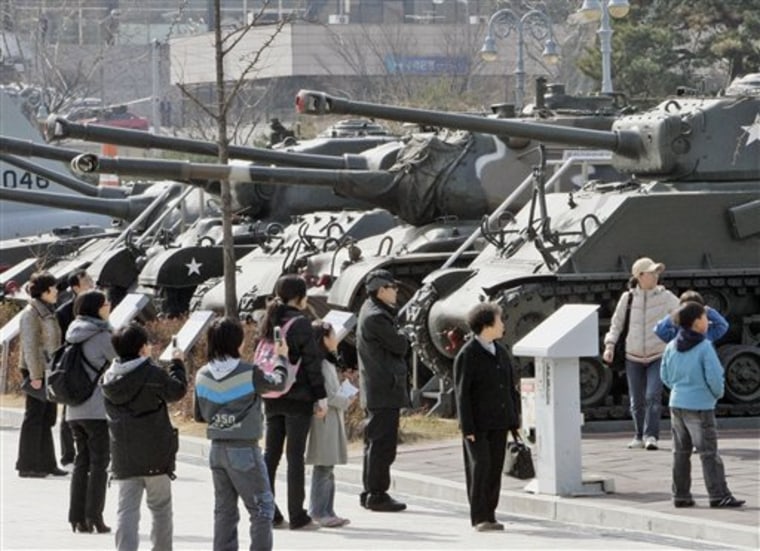North Korea lashed out Thursday at critics warning it not to test a long-range missile, saying it would punish those trying to disrupt its plan to send what it calls a satellite into orbit.
North Korea announced earlier this week that it was preparing to shoot a communication satellite into orbit as part of it space program. The U.S., South Korea and other neighboring countries believe the launch may be a cover for a missile test-fire, saying the action would trigger international sanctions.
On Thursday, the Committee for the Peaceful Reunification of (North) Korea accused South Korea of "trumpeting about 'sanctions'" against its satellite launch, saying outsiders will know "what will soar in the air in the days ahead."
"If the puppet warmongers infringe upon our inviolable dignity even a bit ... we will not only punish the provokers but reduce their stronghold to debris," the committee said in a statement carried by the country's official Korean Central News Agency.
Kim Myong Gil, minister to the North's U.N. mission in New York, also told reporters in Atlanta on Thursday that his country would implement "the satellite launch as scheduled," saying timing of its launch remains to be seen, according to South Korea's Yonhap news agency. The report said Kim was in Atlanta to take part in an international academic forum.
Bid for Obama's attention
Analysts say the North's planned launch is seen as a bid for President Barack Obama's attention as international talks on its nuclear programs remained stalled for months and tensions with South Korea are at their highest level in a decade.
Thursday's statement mainly targets the South Korean government of President Lee Myung-bak, who took office one year ago with a pledge to take a tougher line on the North. It didn't mention the United States.
South Korea's Dong-a Ilbo newspaper reported Thursday that North Korea has built an underground fueling facility near its launch pad, making it harder for spy satellites to detect signs that a missile is being prepared for launch.
The facility was built at the Musudan-ni missile site on North Korea's northeastern coast either late last year or early this year, the newspaper reported, citing an unidentified senior South Korean official.
The National Intelligence Service, Seoul's top spy agency, and the Defense Ministry declined to confirm the report, citing the sensitivity of intelligence matters.
Analysts said satellite imagery taken last week revealed a flurry of activity at the Musudan-ni test site but no indication a rocket had been mounted on the launch pad. Once mounted, the rocket could take days to fuel.
Changes in commercial satellite images captured Wednesday by DigitalGlobe indicate progress toward a launch, said Tim Brown, director of Talent-Keyhole.com, an independent imagery analysis firm in the U.S. He predicted a launch within weeks.
Missile tests
In 1998, North Korea test-fired a long-range Taepodong-1 ballistic missile over Japan and then claimed to have put a satellite into orbit. In 2006, the country also test-launched a longer-range Taepodong-2 missile believed capable of reaching Alaska, but it plunged into the ocean shortly after liftoff. The North is believed to be working on an upgraded Taepodong-2 capable of reaching the U.S. west coast.
The U.N. Security Council passed a resolution in 2006 prohibiting Pyongyang from ballistic activity. South Korea says it would consider either a satellite or missile launch a threat and violation of the U.N. ban since both use similar rocket delivery systems.
Yonhap reported Thursday that chief Chinese nuclear envoy Wu Dawei visited Pyongyang last week to discuss the North's missile launch and how to resolve the deadlocked nuclear negotiations.
Yonhap quoted unnamed diplomats in Beijing as saying Wu is believed to have expressed China's concerns that the North's missile launch would cause a negative impact on efforts to produce progress in the deadlocked nuclear talks.
Yonhap also said the North is believed to have expressed its intention to resume the disarmament talks during Wu's trip from Feb. 17-19.
Moon Tae-young, spokesman at the South Korean Foreign Ministry, said he has no information on the Yonhap report. The Chinese Foreign Ministry was not available for comments late Thursday.
More on North Korea
